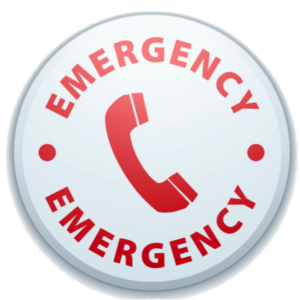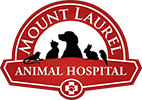Since 1976, Mount Laurel Animal Hospital & 24 Hour Emergency Service, has provided quality emergency medical care to pets in Mount Laurel and the Burlington County region. Dr. Christopher Torre, Dr. Robert Mankowski and the entire veterinary staff at our South Jersey emergency animal hospital are highly trained and have extensive experience treating a wide range of animal emergencies including foreign body removal, cardiac resuscitation, abdominal surgery, endoscopy, ultrasound and more. Our state-of-the-art Mount Laurel facility, experienced emergency veterinarians, and caring and compassionate staff are available 24/7/365 to help in your pet's time of need. When your beloved pet needs emergency care, visit Mount Laurel Animal Emergency Service or call (856) 234-7626. Walk-ins are always welcome. You and your pet can depend on us!
COMMON EMERGENCIES
FOREIGN BODY
Pets who have a recent history of eating foreign material, such as cloth material or plastic toys, can present with signs of profuse vomiting and decreased appetite due to an intestinal obstruction. Often the intestinal obstruction can be diagnosed based on abdominal x-rays, bloodwork, and/or an abdominal ultrasound. Once the obstruction has been identified, emergency surgery is required to remove the foreign body and relieve the blockage. In some cases, patients require supportive care and fluid support prior to surgery. An exploratory abdominal surgery is performed and the surgeon will identify the compromised area of the intestine. The foreign material can often be removed through a small incision into the intestine (enterotomy) or by removing a small section of compromised intestine (resection and anastomosis). In some cases, a nasogastric tube is placed during surgery to help remove excess fluid from the patient’s stomach in the post-op period. The patient is usually recovered in the ICU and remains hospitalized for 2-3 days or until they successfully resolve their clinical signs of vomiting and inappetance.
FELINE URINARY OBSTRUCTION
Cats with a recent history of straining to urinate, blood in urine, lack of urination, or vocalizing during urination should be seen urgently by a veterinarian. Some cats experience flare-ups of feline lower urinary tract disease (FLUTD), which is a multi-factorial disease process that leads to inflammation of the urethra and difficulty passing urine. These patients can often be managed medically and with diet and environmental changes to reduce stress, at least temporarily. In other cases, cats are experiencing a urethral blockage due to stones or grit and have a very enlarged, hard bladder due to true inability to pass urine. These patients can often be systemically ill and have severe electrolyte derangements that need to be corrected immediately. Cats with urinary stones or grit need to be urgently unblocked by passing a urinary catheter under anesthesia. The urinary catheter is often kept in place for 24-48 hours during hospitalization to ensure the urinary blockage does not recur. Typically, cats are monitored in hospital for 12-24 hours after the urinary catheter is removed prior to discharge.
PENETRATING WOUNDS
Wounds from animal attacks, hit by car events, or other traumas should be seen immediately by a veterinarian. The patient is initially examined to make sure there are no other signs of systemic illness such as internal bleeding or broken ribs. Often the wound that is visible on the surface is just the tip of the iceberg and there is much more extensive tissue damage in deeper layers. These wounds need to be addressed surgically to remove gross contamination and non-viable tissue without good blood supply. Typically, patients are placed under anesthesia or heavy sedation and the wounds will be explored surgically to evaluate the extent of damage, flushed with sterile fluids, and occasionally have drains placed to prevent formation of infection or abscess. Some wounds heal best when left open to heal by second intention and require follow-up with a veterinarian for bandage changes and/or repeat surgical procedures.
TOXIN INGESTION
Pets that get into cleaning chemicals, household medications, rat poison, or recreational drugs should be seen immediately by a veterinarian. Typically, we need owners to call the ASPCA Poison Control hotline to provide the exact toxin ingestion to the veterinary toxicologist. This helps inform the veterinarian of all possible effects of the medication on the pet’s health. The veterinarian will then speak directly with ASPCA Poison Control and develop a treatment plan specific to your pet’s needs. This likely will involve IV fluid support, bloodwork, and close monitoring in hospital up to 72 hours as the effects of many toxins are delayed.
GI UPSET
Animals with vomiting, diarrhea, regurgitation, decreased appetite, or anorexia should be evaluated by a veterinarian. The history of the GI upset is critical to identify the likely cause. Common causes include gastroenteritis due to dietary indiscretion, foreign body, parasite infection, colitis, or even inflammatory bowel disease. Diagnostics such as x-rays, bloodwork, fecal float and smear, and abdominal ultrasound can be helpful to initially identify the cause. In some cases, the exact cause of GI upset is not identified and supportive care is initialized with bland diet. Follow up with a veterinarian is required if GI upset does not improve within 48 hours.
SEIZURES
Just like humans, animals experience different forms of seizures of varying severity. Any seizure activity should be evaluated by a veterinarian. Patients who come in that are actively seizing will receive IV medication to try to stop the seizure or slow the frequency of seizures. Patients may require cooling IV fluids or other treatments to prevent hyperthermia (high body temperature). Often the age of the patient, history of toxins or head trauma, or other clinical signs are key to making an appropriate diagnosis. Causes of seizures include metabolic abnormalities, toxin exposure, head trauma, idiopathic epilepsy, clots within the brain, brain inflammation or infection, or brain tumors. An initial full blood panel is important to rule out metabolic causes of seizure activity. A consult with our board-certified Neurologist may be recommended to facilitate additional work-up, including anesthetized MRI. In some cases, it is recommended for a patient to remain in the hospital for close monitoring or to start anti-convulsant medications.
WHAT IS A C-SECTION?
C-SECTIONS
A C-section (or cesarean) is major surgery. It involves the surgical removal of kittens or puppies from the uterus of your dog or cat. C-sections are often performed in emergency situations where an animal won't be able to give birth through natural means. The recovery from a C-section is usually quite quick and complications are rare.
WHY DOES MY PET NEED A C-SECTION?
C-sections are usually done in emergency situations for cats and dogs. Most often, this happens when an animal has been laboring for too long or won't be able to give birth naturally for some other reason.
ARE THERE ANY RISKS ASSOCIATED WITH C-SECTIONS?
Complications are rare as a result of C-section procedures, but there is some risk involved in any surgery. Possible complications could include:
- Infection
- Mastitis
- Pyometra: Uterine infection
- Post-operative hemorrhaging
- Anesthetic death
WHAT CAN I EXPECT DURING THE IMMEDIATE RECOVERY PERIOD?
Anesthesia should wear off shortly after the surgery. By the time most cats or dogs have returned home, they will have fully recovered from the effects of the anesthetic, however, it is possible for recovery to take up to 6 hours. During the recovery period, make sure you keep a close eye on your pet to ensure that she doesn't hurt herself or her new babies. Make sure your pet is fully awake and alert and has begun caring for her children before leaving her alone with them. Your new mom should begin eating within the first few hours of returning home. Make sure she is only having a small amount of food or water at a time, but offer them to her every 15 minutes to a half-hour for the first 24 hours post-surgery. If she eats or drinks too much, however, she could vomit. During their nursing period, your pet will need lots of food. For the first week after surgery, she will require about 1.5 times her regular food and after a month she should be eating anywhere from 2 - 3 times as much food as normal. Make sure she is being fed a higher quality food too in order to give her and her new babies enough nutrition.

